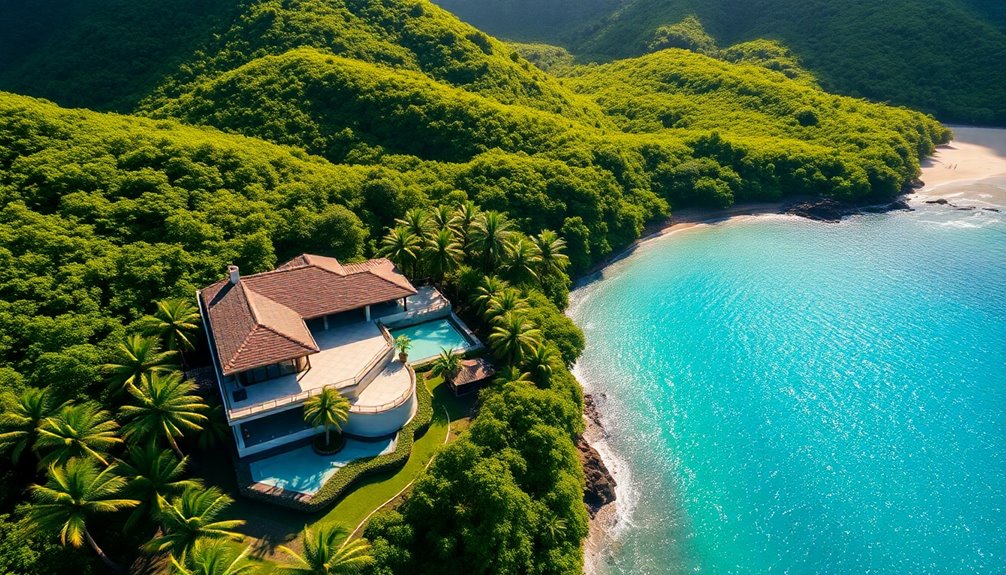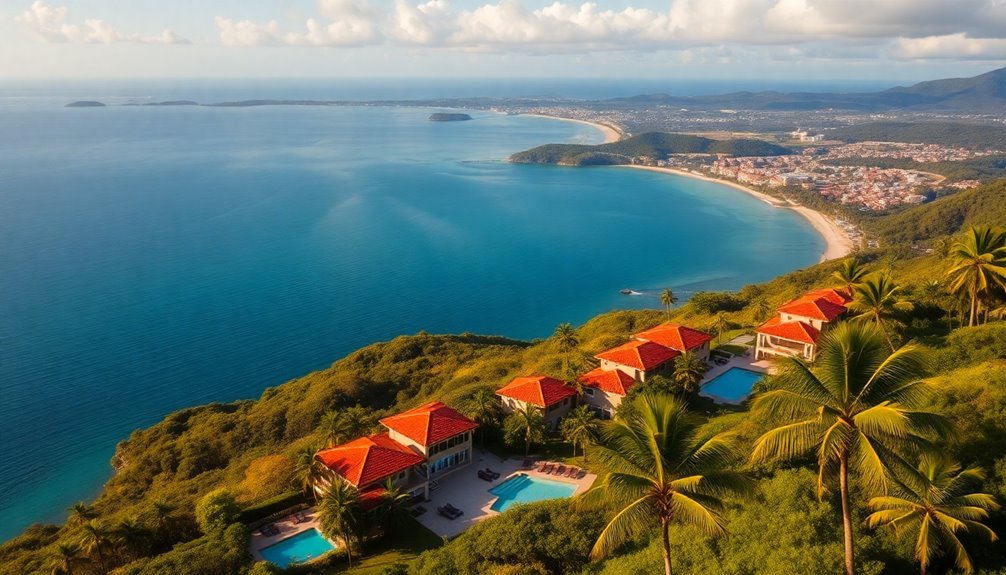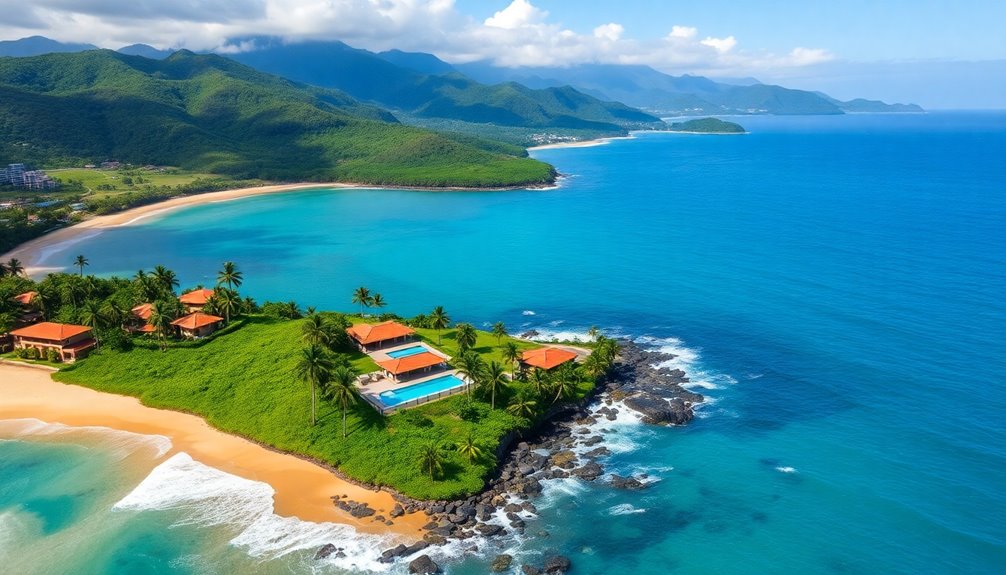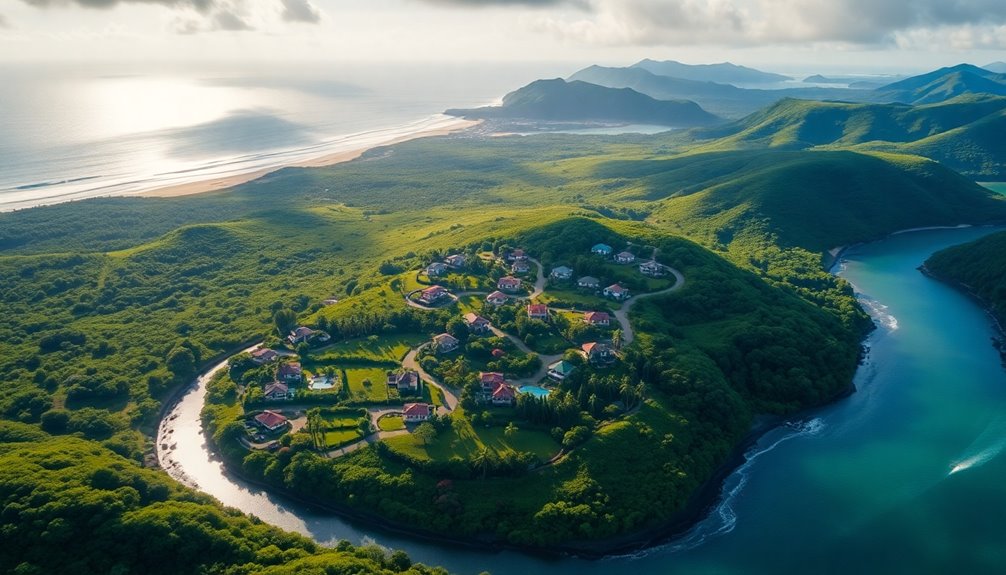Costa Rica's real estate market is a vibrant opportunity for you to invest in tropical properties. With regions like Guanacaste showing impressive demand and rising condo prices, you'll find many options that suit various budgets. The economy is stable, with rental yields between 5.3% and 8%, and potential annual profits outpacing traditional investments. Understanding the local market, legal considerations, and tax benefits can enhance your investment journey. By conducting thorough market research, you'll discover where the best opportunities lie, making it easier for you to choose the right property for your investment goals. There's much more to explore about this enticing market.
Key Takeaways
- Costa Rica's real estate market is projected to grow by 2.47% annually, offering solid investment potential.
- Focus on regions like Guanacaste for higher returns, with rental yields ranging from 5.3% to 8%.
- Conduct thorough market research to identify promising neighborhoods and understand local trends for better investment decisions.
- Legal due diligence, including title verification and compliance with local laws, is essential for successful property transactions.
- Foreign investors can qualify for residency with a real estate investment of US$150,000 or more, enhancing investment opportunities.
Current Market Overview

The Costa Rica real estate market is currently experiencing a notable shift, with overall transactions down by 10% compared to last year. However, if you're considering properties in the Guanacaste and Nicoya Peninsula region, you'll notice a different trend. Here, transactions have surged by an impressive 28%, highlighting the area's growing appeal.
While the Central and South Pacific regions saw a slight decrease of 6%, the Central Valley experienced a more significant drop, with transactions down by 13%. This decline reflects a general slowdown in market activity, yet it's crucial to recognize these regional variations as you navigate your options.
Inventory is on the rise, with single-family home listings increasing by 24% nationally. Specifically, the Guanacaste and Nicoya Peninsula regions saw a 17% increase, offering you more choices. Additionally, the single-family home inventory in the Central and South Pacific regions has seen a 26% increase, providing even more options for potential buyers.
Despite the overall drop in transactions, properties are selling faster, with a 33% decrease in average days on the market. This trend suggests that buyers are making quicker decisions, which could impact your investment strategy moving forward.
Regional Trends in Real Estate

Regional trends in Costa Rica's real estate market show significant variations that can influence your investment decisions.
In Guanacaste and the Nicoya Peninsula, transactions are up 28% this year, with a notable decrease in days on the market by 28%, now averaging 418 days. However, average sold prices for single-family homes have dropped by 36%, now at $967,506.
In the Central and South Pacific regions, you'll find transactions down by 6%, yet days on the market have reduced by 36%. Single-family home prices are up 42%, averaging $893,841, which signals strong demand despite the overall dip in transactions.
Meanwhile, the Central Valley is experiencing a 13% drop in transactions, but single-family home prices have increased by 17% to $476,075. Infrastructure improvements, like new highways and international airports, are reshaping these markets, creating potential opportunities.
Consider that municipal efficiency and zoning laws can also affect your investment experience. Understanding these regional distinctions will better equip you to navigate Costa Rica's dynamic real estate landscape.
Investment Potential in Costa Rica

What makes Costa Rica an attractive option for real estate investment? The country offers remarkable stability, essential for those seeking steady rental income and capital gains.
With a Fragile State Index of 41, it showcases robust economic growth, low poverty, and political stability. This stable environment guarantees your real estate portfolio remains secure and reliable. Reliable economic growth fosters a secure investment climate that further encourages investor confidence.
Rental properties here yield attractive gross returns, ranging from 5.3% to 8%. The rising wealth of the population, evidenced by a 7.2% increase in GDP per capita over the last five years, fuels demand, especially in urban centers like San José.
The rental housing sector has also seen a significant growth of 5.4%, highlighting increasing demand. Additionally, the market is influenced by both local and international factors, creating dynamic opportunities.
Properties are selling faster, with a notable increase in buyer activity. Even amidst rising interest rates, foreign investment, particularly in luxury real estate, continues to thrive.
Costa Rica also offers favorable tax benefits for investment properties, enhancing their appeal. With moderate inflation and supportive financing options, it's clear that investing in Costa Rica's real estate presents promising potential for long-term success.
Economic Stability and Growth

Frequently recognized for its economic stability, Costa Rica presents a compelling landscape for real estate investment. The country's economy has shown remarkable resilience, with a GDP growth forecast of US$90 billion for 2023, up from US$52.6 billion in 2015.
Since emerging from recession in 1997, Costa Rica has enjoyed steady growth, including a notable 7.8% increase in 2021 following the pandemic's contraction.
Diverse economic sectors like tourism, agriculture, technology, and manufacturing enhance its stability. The presence of multinational corporations such as Intel and HP signals a favorable business environment and a skilled workforce, driving demand for various real estate opportunities. Additionally, with agriculture accounting for approximately 6.5% of GDP, the country demonstrates a balanced economic foundation.
Tourism remains a key economic driver, attracting millions and boosting the market for hotels and vacation rentals.
While global events have posed challenges, including a recent slowdown in external demand, the overall economic outlook remains positive.
Investments in infrastructure and business development continue to enhance the appeal of regions like Guanacaste and Costa Ballena. As inventory rises and buyer activity increases, the real estate market reflects both stability and growth, making it an attractive option for investors like you.
Understanding Rental Yields

Understanding rental yields in Costa Rica is essential for anyone considering real estate investment. The average gross rental yields range from 5.3% to 8.0%, depending on the property type and location. San Jose is particularly lucrative, with houses yielding around 8.6% and apartments about 7.5%.
Here's a quick breakdown of rental yields across various locations:
| Location | Property Type | Average Yield |
|---|---|---|
| San Jose | Houses | 8.6% |
| Apartments | 7.5% | |
| Curridabat | 1-Bedroom Apartments | 8.28% |
| Escazú | 3-Bedroom Apartments | 6.85% |
| Santa Ana | 2-Bedroom Apartments | 8.31% |
Keep in mind that gross yields are before taxes and other expenses, which typically lower net yields by about 1.5% to 2%. Factors such as location, economic indicators, and local regulations play a significant role in determining these yields. As the middle class grows and tourism increases, demand for residential properties continues to rise, making it a prime time for investment. With a projected GDP growth of around 3-4% in 2025, the economic outlook enhances the attractiveness of property investments in the region.
Capital Appreciation Insights

When you explore capital appreciation in Costa Rica real estate, it's crucial to look at historical price trends and regional market variations. Different areas show varying growth potential, which can greatly impact your investment decisions. Understanding these dynamics will help you gauge the future value of your property investments. Additionally, the stable property market supported by strong economic fundamentals contributes to a favorable environment for capital appreciation.
Historical Price Trends
Over the past decade, Costa Rica's real estate market has exhibited notable price trends, reflecting a robust capital appreciation landscape.
In San Jose, for instance, house prices grew by 3.7% year-on-year, reaching an average of US$1,110 per square meter. Condominium prices also saw an increase of 1.8%, averaging US$1,724 per square meter. The rental returns for houses hover around 8.6%, while apartments yield about 7.5%. Additionally, national gross rental yields average around 7.27%, indicating a healthy rental market.
In Guanacaste, however, you'll notice some regional variations. While house prices dropped by 2.8%, condos surged by 40.8%. Liberia experienced a modest 1.7% increase in house prices, whereas Santa Cruz and Nicoya faced declines.
On the other hand, Alajuela's house prices rose by 5.5% and Cartago saw condo prices leap by 15.9%. Heredia's condos soared by 16.7%, showcasing local market resilience.
Future Growth Potential
Costa Rica's real estate market is poised for considerable growth, driven by a combination of economic stability and increasing demand.
With the economy expected to grow by 4% in 2024 and 3.5% in 2025, you're looking at a long-term growth projection of 15.9% over the next five years. This sustained economic momentum indicates that property values will likely rise, alongside heightened rental demand. Additionally, the country's political stability enhances investor confidence, further stimulating the real estate sector.
The real estate market itself is anticipated to grow by 2.47% annually, reaching approximately US$360.4 billion by 2028.
You'll find that eco-friendly properties are increasingly sought after, catering to a growing consumer base that values sustainability. Areas like Tamarindo and Guanacaste are seeing a boom in short-term rentals, driving demand and escalating prices.
When investing, you can expect annual profits between 12% and 16%, considerably outperforming traditional banking options.
Luxury resort developments are also on the rise, appealing to international buyers seeking vacation homes.
As you consider your investment, keep in mind that effective property management practices will enhance profitability, making your investment even more rewarding in the long run.
Regional Market Variations
While the real estate landscape in Costa Rica shows promise for growth, regional market variations present unique opportunities and challenges for investors.
In Guanacaste and the Nicoya Peninsula, property sales have surged by 28% this year. However, single-family home prices dropped by 36%, averaging $967,506, which could signal a chance for savvy investors to capitalize on lower prices amidst rising demand.
In the Central Valley, you'll find a different trend. Property sales fell by 13%, but single-family home prices increased by 17%, averaging $476,075. This area benefits from economic stability and tech companies boosting property values, particularly in Alajuela and Cartago. Additionally, the introduction of a new digital nomad visa has attracted remote workers, diversifying the market.
The South Pacific region also presents intriguing possibilities. Although property sales dropped by 6%, single-family home prices rose by 42%, averaging $893,841.
Infrastructure projects and a new international airport promise to elevate market demand, making this a potentially lucrative area for future investment.
Understanding these regional variations can help you navigate the complexities of Costa Rica's real estate market, ensuring you make informed investment decisions that align with your goals.
Tax Benefits for Investors

Investing in real estate in Costa Rica offers several tax benefits that can greatly enhance your financial return. By taking advantage of these incentives, you can maximize your investment potential while minimizing costs. Here's a quick look at some key benefits:
| Tax Benefit | Description | Duration |
|---|---|---|
| Transfer Tax Exemption | 20% exoneration on total transfer tax for property acquisitions. | Upon acquisition |
| Income Tax Exemption | 100% exemption from income tax on qualifying capital investments. | Indefinite for qualifying |
| Property Transfer Tax Exemption | 100% exemption from property transfer tax and municipal taxes. | Up to 10 years |
Additionally, you can enjoy exemptions on import taxes for household goods and vehicles, and if you're classified as an investor, the benefits extend to your dependents. Keep in mind that a minimum investment of US$150,000 is required to qualify. These incentives not only reduce your tax burden but also simplify your financial journey in this tropical paradise. As a result of economic stability, these tax benefits further enhance the attractiveness of investing in Costa Rica's real estate market.
Steps to Successful Investing

To succeed in Costa Rica real estate investing, start by conducting thorough market research to grasp current trends and neighborhood potential. Additionally, understanding that foreign buyers can obtain residency with a real estate investment of $150,000 or more can enhance your investment strategy. Next, evaluate property conditions to guarantee you're making a sound investment. These steps will help you make informed choices and maximize your returns.
Conduct Market Research
Conducting thorough market research is essential for anyone looking to invest successfully in Costa Rican real estate. Start by identifying promising neighborhoods that align with your investment goals. Analyze the local culture, lifestyle, and available amenities; these factors can greatly influence property evaluations. Assess current property values to inform your pricing strategies and forecast long-term appreciation.
Dive into the local market dynamics by studying the average days properties stay on the market. This insight helps gauge market efficiency. Review sales volume and transaction numbers to understand overall market activity. Keep an eye on infrastructure investments and new developments, as they can drive market growth. Notably, the average days on market for houses has dropped significantly from 273 days in 2023 to 197 days in 2024, indicating an efficient and responsive market.
Tourism plays an important role, especially for short-term rentals, so analyze its impact on demand. Note changes in inventory levels, as they may affect your buying choices.
In addition, familiarize yourself with the legal and regulatory aspects that may impact property acquisition, ensuring compliance with local laws.
Finally, consider the broader economic landscape, including government incentives, infrastructure development, and overall economic stability, as these factors can enhance the attractiveness of your investment.
Evaluate Property Conditions
A thorough evaluation of property conditions is vital for guaranteeing a wise investment in Costa Rican real estate. Start with property inspections, focusing on the construction's condition, including the structure, electrical, and plumbing systems.
Check both interior and exterior finishes for maintenance needs, and be on the lookout for any hidden issues that might affect the property's value. Don't forget to assess features like pools, tropical gardens, and outdoor areas.
Next, conduct a comparative analysis by examining recent sales of similar properties in the area. This will help you determine a fair market value, considering location, size, and current market trends. Understanding the comparative/market price is crucial for making a well-informed decision.
Infrastructure and accessibility are also important. Evaluate the quality of roads and the availability of basic services like water, electricity, and internet. Proximity to amenities and attractions can greatly impact the property's value.
Lastly, guarantee legal and regulatory compliance. Secure title insurance and conduct an independent title search to confirm the property's clear title.
Familiarize yourself with local regulations to avoid any legal hurdles during the acquisition process. By following these steps, you'll be well-prepared to make an informed investment.
Importance of Market Research

In the ever-changing landscape of Costa Rica’s real estate market, understanding the nuances of market research is essential for making informed investment decisions. By analyzing regional trends, you can identify where property values are shifting. When considering investments in Costa Rica, it’s also important to evaluate how geopolitical and economic factors may impact the market. Additionally, comparing the Costa Rican real estate market to other international markets, such as the Chilean property market, can provide valuable insights into potential investment opportunities. Understanding how different markets interact and influence each other can help you develop a well-rounded investment strategy.
For instance, transactions in Guanacaste and the Nicoya Peninsula have surged by 28%, despite a significant drop in single-family home prices by 36%. In contrast, the Central Valley shows a decline in transactions of 13%, yet home prices have increased by 17%.
Evaluating price fluctuations is also essential. The average selling price for single-family homes dropped by 7% nationwide, while luxury homes saw a dramatic 28% decrease. However, in the Central Valley, luxury homes experienced a 15% price increase, highlighting the need to know where the value lies.
Furthermore, analyzing market activity and inventory can give you insights into buyer behavior. With properties selling 33% faster and inventory rising by 24%, it's critical to keep your finger on the pulse. Understanding the impact of infrastructure developments on property values will also provide a clearer picture of future investment opportunities.
Understanding these dynamics will empower you to make strategic decisions that align with both current market conditions and your investment goals.
Navigating Legal Considerations

Understanding market dynamics is only part of the equation when investing in Costa Rican real estate; traversing the legal landscape is equally important.
First, verify all property transactions are registered in the National Registry, which maintains official records of ownership. Without this registration, your investment may lack legitimacy.
You'll need to sign the sale contract before a Costa Rican Notary Public, as this is a legal requirement.
Also, don't overlook due diligence; verify the title's validity and check for any zoning laws, liens, or encumbrances. Property inspections are essential to uncover hidden issues, and securing title insurance can protect you against unforeseen claims.
Be aware of the different types of property ownership. Fee simple ownership grants full rights, while concession properties, often beachfront, come with stricter regulations. If you're considering concession land, you'll need the right permits. Understanding the implications of land ownership types can also inform your investment decisions.
Engaging a knowledgeable local attorney is highly recommended to navigate the legalities and guarantee compliance with local regulations.
Should disputes arise, they'll be resolved through the Costa Rican legal system, making it critical to understand the process to protect your investment.
Frequently Asked Questions
What Are the Best Locations for Vacation Rentals in Costa Rica?
When you're looking for the best locations for vacation rentals in Costa Rica, consider areas like Tamarindo and Manuel Antonio for their high tourist demand and established amenities.
Guanacaste's stunning beaches, particularly Playas del Coco, are also great choices.
If you prefer a more exclusive vibe, check out Dominical or Santa Teresa.
Don't forget about Puerto Viejo's unique Caribbean charm.
Each spot offers something special for vacationers and solid rental potential.
How Do I Find a Reliable Real Estate Agent in Costa Rica?
"Don't judge a book by its cover."
To find a reliable real estate agent in Costa Rica, start by verifying their legal status and residency.
Look for agents with extensive local knowledge and experience in the market.
Pay attention to their communication skills; you want someone responsive and transparent.
Conduct thorough research, read reviews, and ask about their recent transactions.
This diligence will help guarantee you get a trustworthy partner for your real estate needs.
What Is the Process for Buying Property as a Foreigner?
Buying property as a foreigner involves several key steps.
First, visit Costa Rica to explore areas that interest you.
Once you find a property, conduct due diligence to verify the title is clear.
You'll need to sign a written purchase agreement and provide necessary documentation, like your passport.
Consider hiring a reputable lawyer to navigate local regulations.
After closing, remember that owning property doesn't automatically grant you residency; that's a separate process.
Are There Any Restrictions on Foreign Ownership of Real Estate?
You'd think owning a slice of paradise would be a breeze, right?
Well, there are some twists. Foreigners can't own property directly in the Maritime Zone—those scenic beachfront spots are tricky! You can lease land there, but only after living in Costa Rica for five years.
Plus, border areas have similar rules.
Still, you can own property outright elsewhere, so don't let these restrictions deter your tropical dreams!
How Can I Ensure My Investment Is Protected Legally?
To guarantee your investment's legally protected, start by engaging a qualified lawyer familiar with local property laws.
Verify the property's title and check for any liens or zoning restrictions.
Make sure all necessary permits are in place and that your sale contract is signed before a Notary Public.
Don't forget to register the transaction in the National Registry immediately to safeguard your rights.
Thorough due diligence is key to avoiding future disputes.
Conclusion
In the lush landscape of Costa Rica, your investment journey can flourish like the vibrant flora around you. With a solid understanding of the market, the right research, and a keen eye for opportunities, you're poised to reap the rewards of this tropical paradise. Remember, knowledge is your best ally, and by steering through legal waters and leveraging tax benefits, you'll turn your property dreams into reality. Immerse yourself—your slice of paradise awaits!









